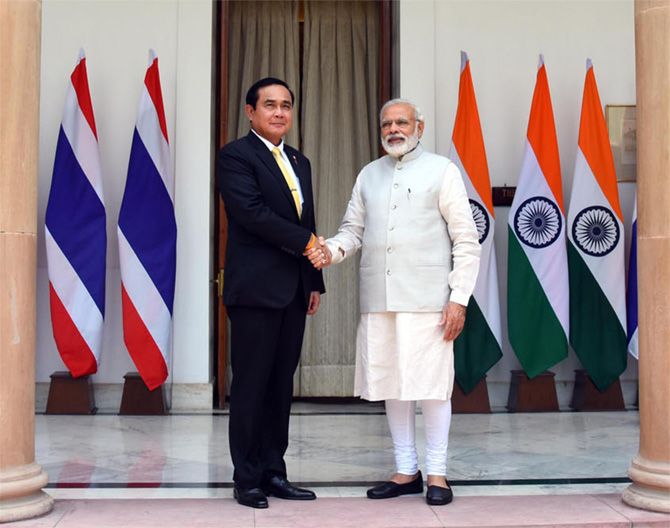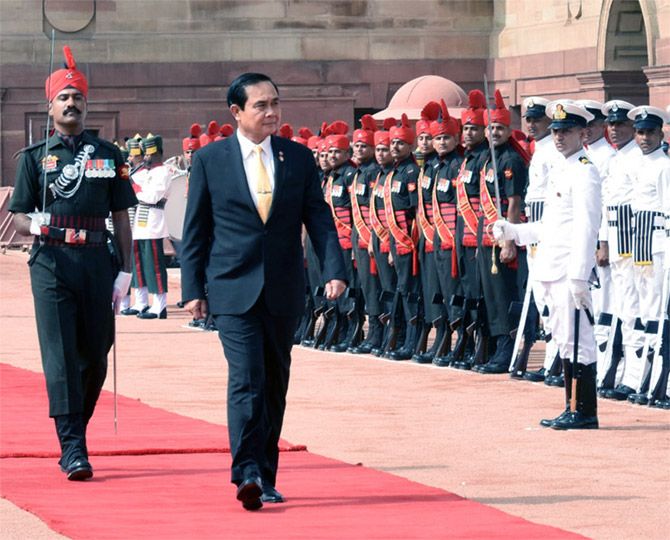Thailand's importance to India's Act East policy is too significant to be overlooked, says Rajaram Panda.

Thailand's Prime Minister General Prayut Chan-o-cha paid a State visit to India from June 16 to 18. The general was accompanied by a large delegation including his deputy prime minister, five cabinet ministers, 42 business leaders and senior officials.
General Chan-o-cha's visit is the first by a Thai leader during the Modi administration, the last Thai prime minister to visit India was then prime minister Yingluck Shinawatra in 2012, when she was the chief guest for Republic Day.
The general's visit assumes importance because of the changes in the strategic environment and the prime ministerial dialogue is seen as a medium of sharing interests on common challenges and addressing them appropriately.
At the economic level, deepening ties by fostering trade and economic cooperation was a major objective of the general's visit, which was why a business delegation accompanied the prime minister. It was appropriate then that all three trade bodies -- the CII, FICCI and Assocham -- participated in a business event hosted on the occasion. It was there that an India-Thailand Business Forum was established.
The sectors for possible collaboration between Indian and Thai companies are iron and steel, infrastructure, machine and tools, banking and food processing. Thai companies can participate in India's Make in India programme with a view to scale up economic ties.
This increasing bonhomie is supported by the historical civilisational ties that both nations share. As in other Asian countries, in Thailand too, Buddhism is an important binding factor. Being
Next door to Myanmar through which India finds the only gateway to ASEAN, Thailand's importance to India's Act East policy is too significant to be overlooked. This is complemented by Thailand's Look West policy.
As a strategic partner, India and Thailand work closely in several regional forums -- the East Asia Summit, ADMM+, the India-ASEAN Summit and others. Both countries are members of the Mekong-Ganga Cooperation, BIMSTEC, the Indian Ocean Rim Association and the Asian Cooperation Dialogue. These forums provide a platform for both India and Thailand to interact and share issues of common concerns.
In the economic realm, bilateral trade has grown eight times in the last 15 years, totalling about $7.93 billion. India has an adverse balance of trade with exports accounting for $2.63 billion as against imports totalling $5.3 billion. This imbalance can be addressed by greater market access in Thailand.
Both countries have had 29 rounds of discussions to negotiate a Free Trade Agreement. The ultimate aim is to arrive at a Comprehensive Economic Cooperation Agreement. Already, 84 tariff lines have been liberalised and discussions are ongoing for more.
There are other areas where both India and Thailand share commonality of interests. Prime Minister Modi and General Chan-o-cha discussed defence, security, education, science and technology and people-to-people contacts.
About 250,000 people Thai nationals are of Indian origin. The connection of this segment of the Indian Diaspora with the country of their origin contributes immensely to the strong bonding at the people-to-people level.
As a fallout of this, tourism has blossomed, so much so that about one million Indian tourists visit Thailand every year and about 100,000 Thai tourists, largely Buddhists, come to India.
The significance of the Thai prime minister's visit to Bodhgaya cannot be missed. This soft power component in the India-Thai relationship considerably helps foster mutual understanding.
India is doing its best to attract more tourists from Thailand, especially to its Buddhist sites. Though there are direct flights connecting Bangkok to several Indian cities, there are no direct flights to the Buddhist pilgrimage sites. This impediment restricts the tourist traffic from Thailand to India. The introduction of e-visas for Thai nationals could be an incentive for tourism.

Both India and Thailand have a strong defence relationship, with frequent high-level visits by defence personnel. In 2015, India's air chief and navy chief visited Thailand. The Thai defence minister and the head of its defence research organisation visited India in 2016.
With India opening up its defence industry to foreign collaboration and raising the equity to foreign partners, it could be an attractive option to Thailand to join India as a partner for defence production.
Both nations also conduct regular staff-level talks between their air forces and navies. This is complemented by regular ship visits to each other's ports. There is also a very strong capacity building training element and several training programmes that take place between the two countries.
Thailand being India's maritime neighbour, both nations have a stake in securing the sea lanes of communication and the regular interaction between the two navies helps.
Modi and the general agreed to further enhance the partnership in maritime security, defence and counter-terrorism. Both leaders avoided discussing the ongoing spat between China and other Asian nations over the South China Sea, and focused more on the Indian Ocean.
This is because Thailand is not a party to the maritime territorial disputes in the South China Sea and has avoided taking a position on the issues involved. This did not deter Modi and General Chan-o-cha to enhance 'cooperation in the maritime domain including anti-piracy cooperation, security of the sea lanes of communication including coast guard cooperation to maintain peace and ensure safety and security of navigation in the Indian Ocean.'
2017 marks a significant milestone in India-Thailand ties. It is the 70th anniversary of the establishment of diplomatic relations. Prime Minister Chan-o-cha's visit will provide further impetus as both nations celebrate this milestone next year.
Dr Rajaram Panda, former Senior Fellow at the IDSA, New Delhi, and based in Delhi, is a leading expert on security/strategic issues of the Asia-Pacific.










